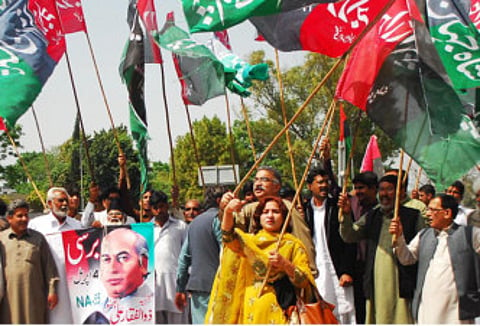Bhutto’s legacy very much alive
A segment of Pakistan’s society has learnt to speak out

Saturday’s 36th anniversary of the 1979 hanging of Pakistan’s former prime minister Zulfiqar Ali Bhutto came not just as a reminder of a dark chapter in Pakistan’s history, it was also a powerful reminder of the ways in which the legacy of Pakistan’s once determined democratic politicians has been sullied by a markedly different breed of politicians with virtually no appreciation of just how a credible democracy ought to be nourished and stabilised.
Put succinctly, Pakistan’s political past and present make for a rather sharp contrast between a time gone by of hope as opposed to the loss of hope in the country’s future.
As crowds of followers of Bhutto from his Pakistan People’s Party (PPP), gathered at his final resting place in the remote city of Naudero in Pakistan’s southern Sindh province, there was little to witness of his powerful legacy. The party he founded and led is now overseen by Asif Ali Zardari, the late prime minister’s son-in-law, who practically took charge of the PPP after the 2007 tragic assassination of Benazir Bhutto, Bhutto’s elder daughter. The party under Zardari today functions in a manner which goes against the very principles it was founded on.
Bhutto rests alongside his two sons — Murtaza and Shahnawaz — both of whom also died in tragic circumstances. Benazir Bhutto’s tomb is not too far from her father’s and she lies along with Nusrat Bhutto, Zulfiqar’s widow. Together, members of the Bhutto clan who were once celebrated and compared to the likes of political dynasties such as the Kennedys in the US or the Nehrus in India, stand in sharp contrast to the profile of Pakistan’s politicians of today.
Veering from core principles
Since Benazir’s assassination in 2007, the PPP has gone through a visible transition. Though Zardari calls himself the party’s co-chairman along with Bilawal, the couple’s son who is supposedly the PPP’s chairman, it is indeed Zardari who runs the show.
Rumours of disagreement between the father and son have queered in the past year as Bilawal has stayed away from Pakistan. As for his own record, the former president has had a tainted past, surrounded by allegations of corruption. However, the biggest blow to the PPP has come in the form of its apparent loss of commitment to its founding ideology that ultimately revolved around serving the people.
One fairly recent example of the PPP’s apathy towards popular causes came earlier this year in the midst of Pakistan’s worst fuel shortages. Unlike the years of the PPP under the leadership of the late Benazir Bhutto, the party paid no more than mere lip service to taking up this popular cause. The incident only reinforced a widely held view that the PPP has broken away from its legacy of being a voice of the people to embrace what could best be described as politics of convenience.
Darkest period
In fact, the PPP’s relationship with Prime Minister Nawaz Sharif’s Pakistan Muslim League-Nawaz (PML-N), has only prompted speculation that the two camps (PPP and PML-N) are ideologically allied. The PPP’s loss of determination to stand up for people’s rights can be summed up as a primary reason it has visibly lost its appeal. Saturday’s anniversary was also a powerful reminder of the transition in Pakistan’s politics from the years after Zulfiqar Ali Bhutto’s hanging.
The 1980s under the tenure of the late military dictator General Zia-ul Haq, who ruled the country with an iron fist, remain the darkest period in Pakistan’s history. However, the days of that dictatorship also produced a strong tradition of defiance, which continues to inspire many Pakistanis to this day.
It is the abiding memory of that legacy of defiance which has fuelled recurring resistance to the many malicious aspects of the way Pakistan has been ruled. The late Benazir, who became prime minister for the first time in 1988, to her credit, lifted the many curbs on Pakistan’s media, more than a decade after Zia’s draconian rule began in 1977. The victims of Zia’s oppression included the media as many journalists were among those who were targeted in different manners including being whipped and imprisoned.
If a segment of Pakistan’s society today has learnt to speak out for one cause or another, it is mainly because, in spite of going through the many trials and tribulations over time in an increasingly violent country, a popular spirit of defiance has remained intact. Though surrounded by an increasingly dysfunctional country with a ruling structure that remains tainted with corruption and a blatant failure to rule in the interest of the people, Pakistanis have learnt to remain defiant.
Lack of deliverance
Going forward, if indeed there are elements of hope surrounding Pakistan, one such element must be the ability of Pakistanis to stand up for the right cause. Meanwhile, the ruling class under Sharif in Islamabad and the PPP, which is in charge of the political administration in the southern Sindh province, appears to show a deaf ear to popular voices of dissent. Clear evidence of a disconnect across the country is easily found in areas such as state-provided health care and education, which remain increasingly unable to serve the people.
Across Pakistan, there is virtually no evidence left of the ruling structure striving to deliver the three popular promises which saw a groundswell in Zulfiqar Ali Bhutto’s favour. ‘Roti, Kapra, Makaan’ — or bread, clothing, housing were indeed the slogans which rallied Pakistanis in his favour.
In the aftermath of Zulfiqar Ali Bhutto’s hanging in 1979, Zia’s autocratic and brutal rule suppressed voices of dissent as never before. But Saturday’s remembrance of the late prime minister presented a powerful message — his legacy is here to stay and flourish even if his party has failed to carry his ideals forward.
Farhan Bokhari is a Pakistan-based commentator who writes on political and economic matters.


